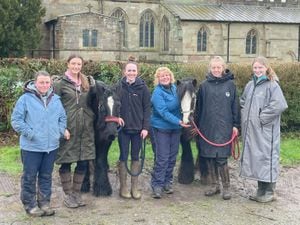High Court appeal over chicken farm near Bridgnorth
Thousands of tonnes of manure generated by a planned new chicken farm are now the focus of a High Court battle.

Farmer, Matthew Bower, of Tasley, near Bridgnorth, plans to produce 1,570,000 standard broiler chickens annually in four large sheds at Footbridge Farm.
But that will generate more than 2,300 tonnes of chicken manure every year, to be spread on Mr Bower's land and other local fields.
Shropshire Council granted planning permission for the scheme, but that is now under challenge at London's High Court.
Spearheading the campaign is concerned local resident, Nicola Squire, who lives less than 700 metres from the farm.
Her barrister, Estelle Dehon, said "dozens, if not hundreds" of homes lie within 100 metres of one field on which manure will be spread.
The village of Alveley and a residential neighbourhood of Bridgnorth are both nearby, she added.
The farm, if opened, will produce up to 210,000 broiler chickens from chicks in each 48-day cycle, before sheds are cleaned out ready for the next flock.
1,171 tonnes of manure will be spread on Mr Bower's land, and another 1,151 tonnes exported to other neighbouring arable farms.
Although an environmental impact assessment had been carried out, Ms Dehon claimed not enough account had been taken of odour issues.
Smells in the immediate vicinity of the farm had been considered, but not the impact of manure spreading over a wider area, she claimed.
An environmental statement "made no mention of the amount of manure," she told Judge Rhodri Price Lewis QC.
"Nothing is said of where the manure will be spread or what the effects of the spreading will be", she added.
Miss Dehon accepted that a planning officer's report, on which the council relied, "addressed both dust and odour impacts".
But she argued the council was wrong to assume that conditions attached to an environmental permit would "provide an effective system for controlling emissions".
Hugh Richards, for the council, said manure would be removed in sheeted lorries and used as "sustainable fertiliser on agricultural land".
Odours would be "localised and short-lived", particularly if manure was swiftly ploughed in, he added.
And, although stockpiled manure might be smelly for a while, that would only be until "a crust forms".
Spreading manure on arable fields is "normal agricultural practice" and the odour issue had been addressed in the environmental impact assessment.
An agreement between Mr Bower and the council also "ensured a mechanism existed whereby the council could control the spreading of manure to ensure no unacceptable impact on residential amenity", said Mr Richards.
Judge Price Lewis has reserved his decision on Ms Squire's judicial review challenge and will give his ruling at a later date.





